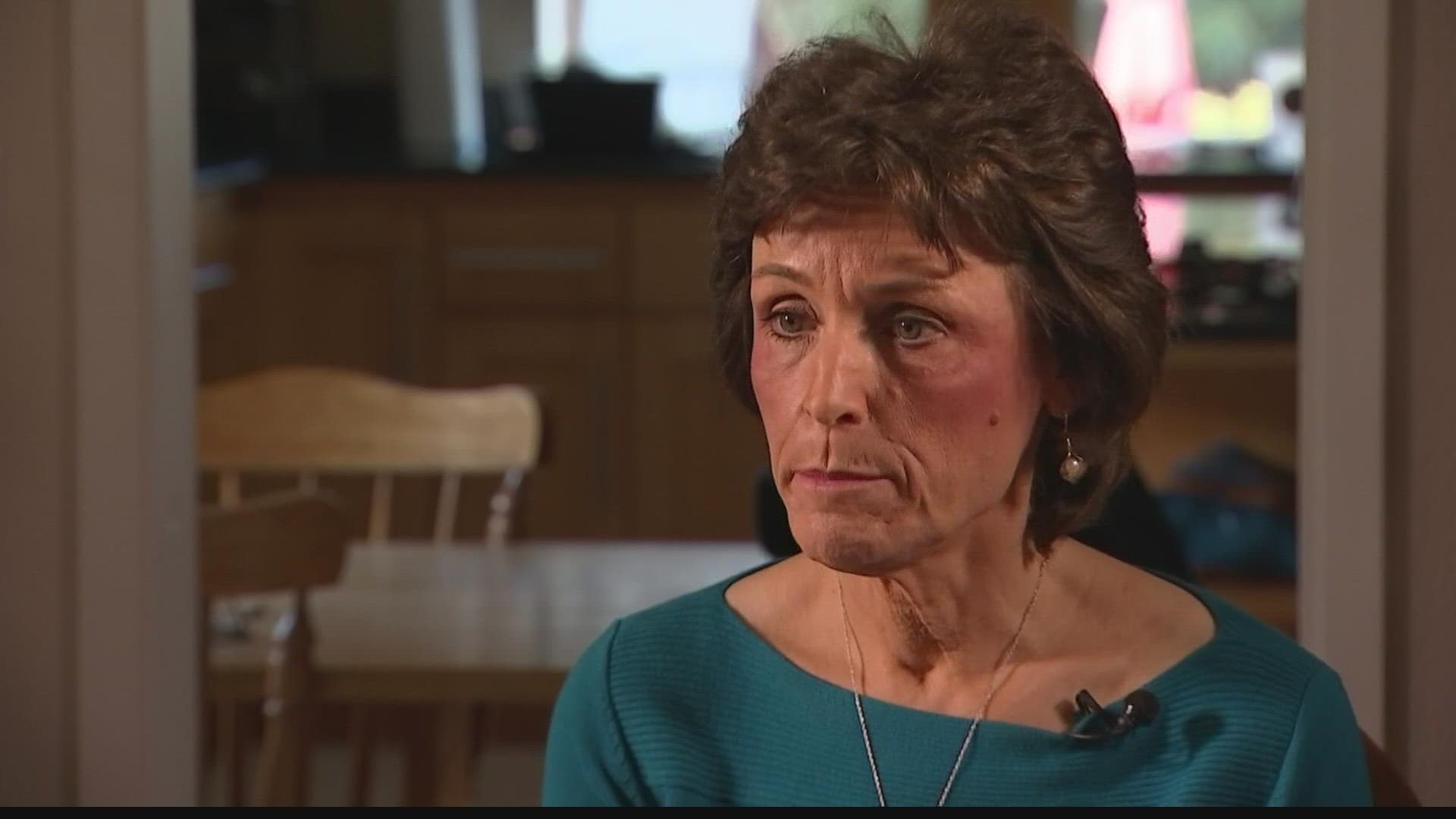Millions of those 5-star online reviews are fake; Here’s how to spot them
Fake reviews are all over the internet and have become a big industry meant to fool consumers.
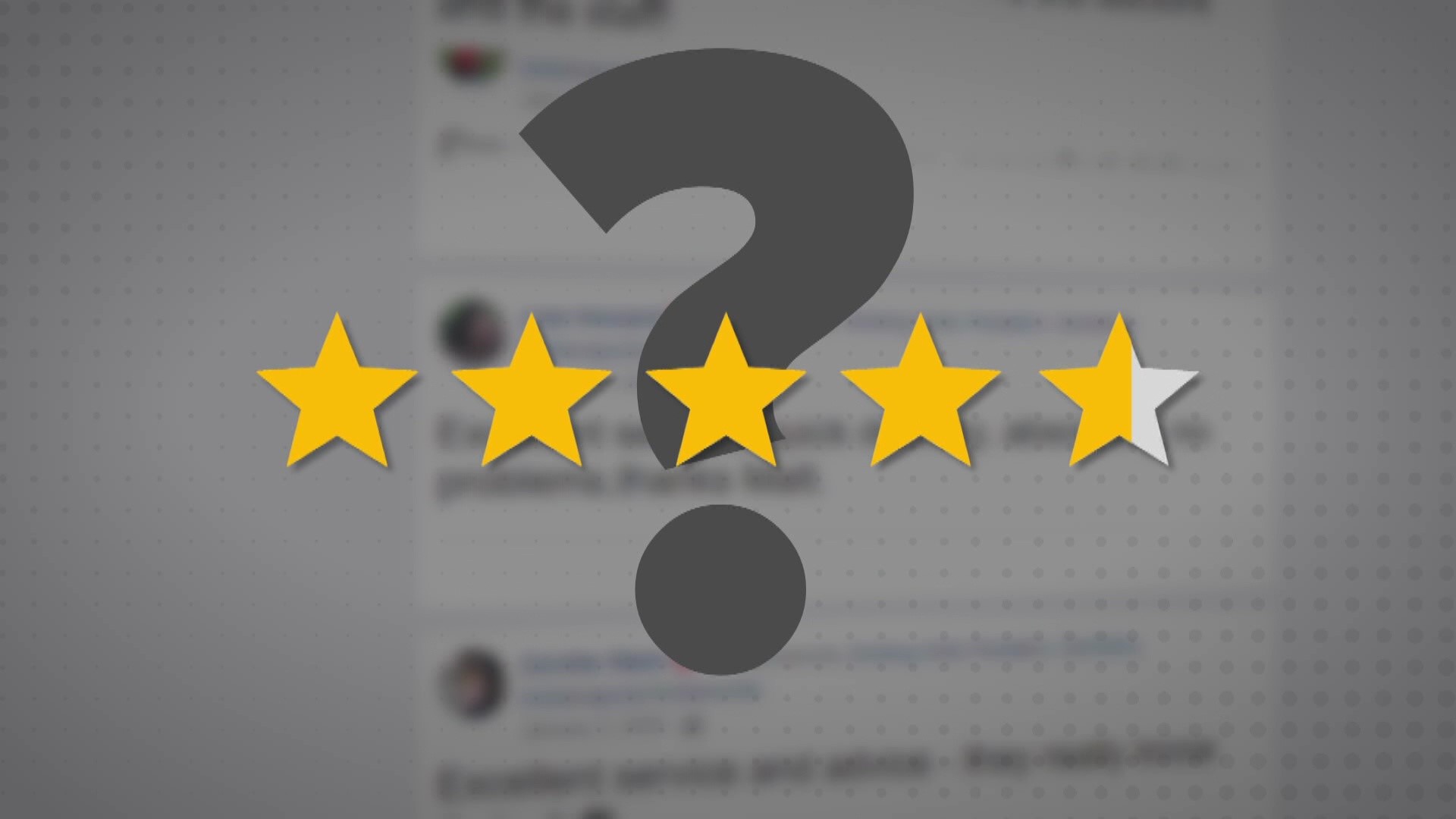
When hiring a contractor, going out to eat, buying a computer or selecting a doctor, the first stop for millions of Americans is to check online reviews. Nearly 90% of consumers consult those reviews before making a purchase, according to a recent study commissioned by TrustPilot.
But a 13News investigation shows many of the 5-star ratings you see online are not what they appear.
For example, 13 Investigates examined an Indianapolis locksmith service that displays nothing but 5-star reviews on Google. Of those 147 glowing reviews, a reviewer named James loved the "Fantastic customer service." Krissy found the company "Professional and friendly!" and Noel declared "Best locksmith in town."
Before you get too impressed, take a closer look at the reviewers’ profile photos. Using free online image search tools, 13 Investigates discovered they are celebrities.
The picture of Noel is actually actor and singer Darren Criss. James used a photo of Akshay Kumar and Radhika Apte, famous actors in India. And Krissy chose a flattering picture of model and Miss Vietnam winner Jennifer Pham.

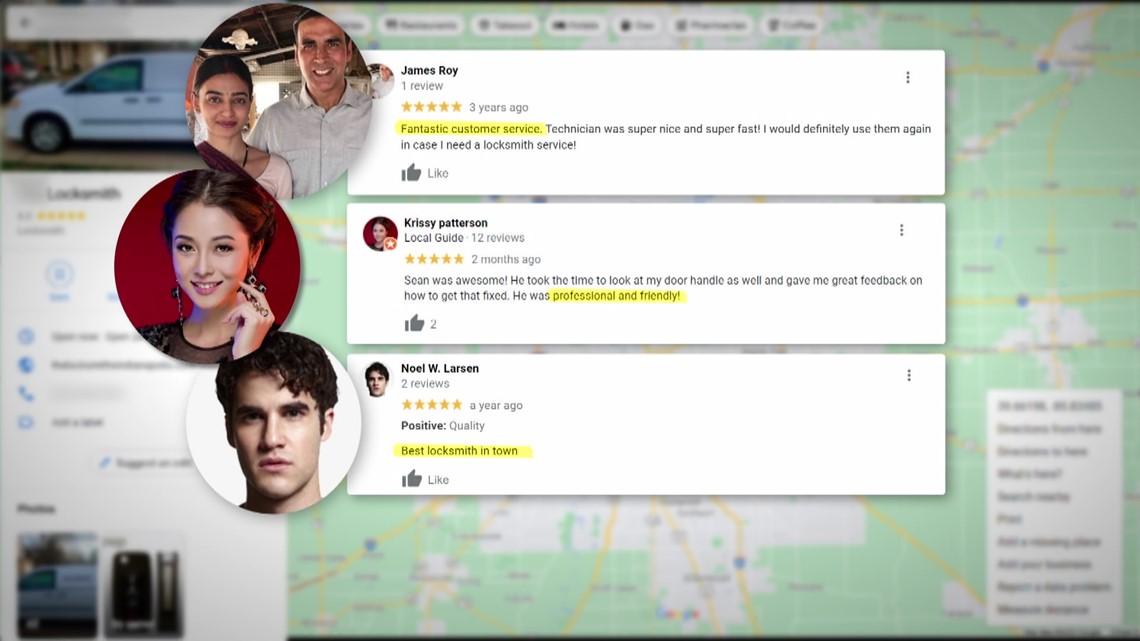
Also suspicious, some of the reviewers seem to have an unusually difficult time keeping track of their keys.
13 Investigates discovered Krissy allegedly locked herself out of her car seven times in a single month – resulting in 5-star reviews for seven different locksmiths across five separate states. Another reviewer named Jane wrote a dozen 5-star reviews for locksmiths, claiming she too was rescued by locksmiths all over the country after locking herself out of her car 12 times in the same month.
Reviews that include celebrity photos and that are written by people who post lots of 5-star reviews for a specific industry within a short period of time show classic warning signs of potential fraud.
The truth is, fake reviews are all over the internet – not just on Google, but on Facebook, Yelp, TrustPilot, Amazon and other popular websites. Fraudulent reviews have become a big industry meant to fool consumers, and most of us have no idea how to tell the difference between reviews that are real and those that are not.
While many online reviews are fake, their consequences can be very real and even devastating.
The fake review hunter

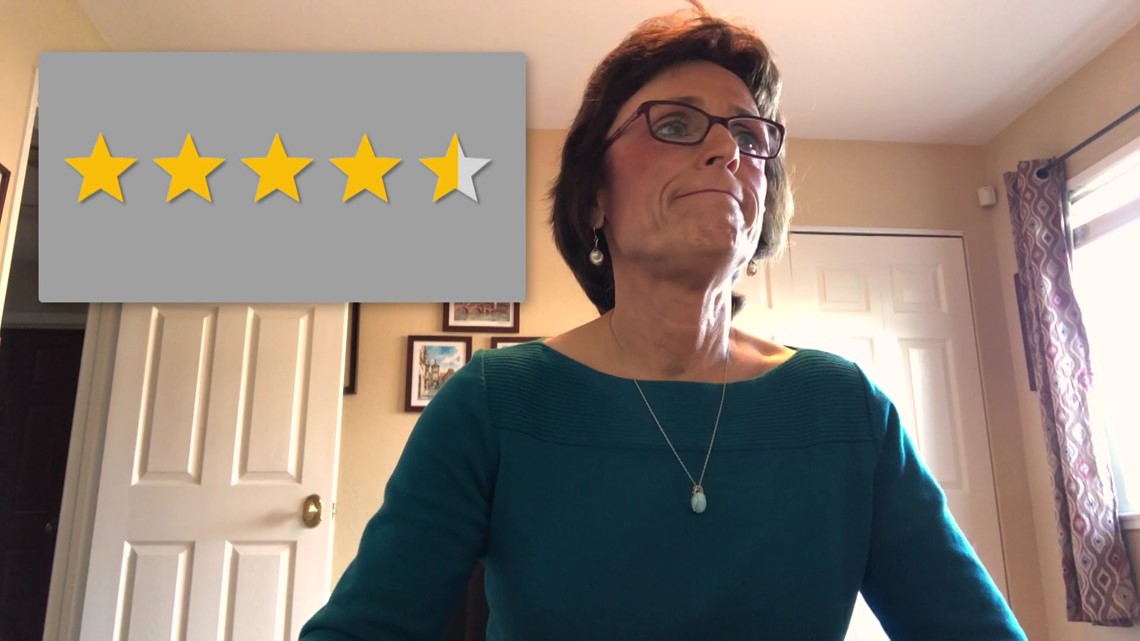
Kay Dean was looking for a doctor when, like many of us, she turned to online reviews for help. She found a licensed physician with a near-perfect online rating and lots of positive comments. But while the reviews were amazing, Dean soon discovered the doctor was not. She had a terrible experience that would have a lasting impact.
“It left me very suspicious about the reviews I relied on, so I started to do some digging and I ultimately uncovered that the practice had someone on Facebook bartering and trading Yelp and Google reviews with other businesses,” she told 13News. “It’s really frustrating. People are being deceived.”
A former federal investigator with the U.S. Department of Education, Dean tapped into her curiosity and knack for investigating to research the reviews of other businesses. She found many others also use fake reviews.
“Doctors, lawyers, dentists, piano teachers, wedding DJs, lactation consultants, you name it,” she said. “I was shocked at what I was seeing, shocked at the amount of review fraud occurring in plain sight on Facebook. The scope of the problem is massive.”
What Dean discovered made her so angry, she now spends much of her time as an online detective and consumer advocate, hunting for and exposing businesses that use fake online reviews on her Fake Review Watch YouTube channel.
One of the businesses that caught her eye is a popular dentistry practice in central Indiana. The case provides a textbook example to help consumers understand how fake reviews work and how to spot them.
Pediatric dentists investigated

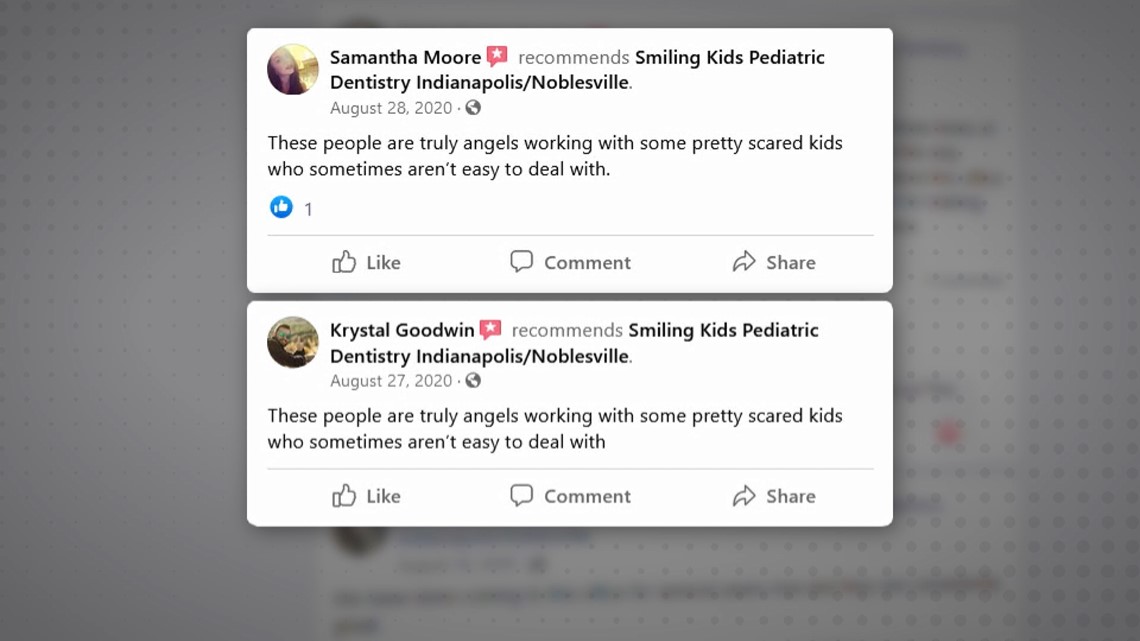
Smiling Kids Pediatric Dentistry is operated by husband and wife dentists Sam Bullard and Swati Singh. With offices in Indianapolis and Noblesville, Smiling Kids currently receives a glowing 4.9 out of 5 possible stars based on Facebook reviews from more than 400 people. It also receives high ratings on Google.
Dean says consumers should view those ratings with caution.
“After analyzing and researching their reviews, my opinion is the majority of their Google and Facebook recommendations are fake,” she said. And Dean has plenty of evidence to support her opinion.
First, many of the Facebook reviews left by supposed Smiling Kids clients include identical comments left by other reviewers.
Krystal Goodwin wrote, “These people are truly angels working with some pretty scared kids who sometimes aren’t easy to deal with.” That exact same review was also left a day later by Samantha Moore.
Hiram Thomas’ review said: “We had a fall over the weekend and Dr. Bullard immediately called us back and was extremely comforting. Thank you!” The following week, Maxine Morales had the exact same experience and left the exact same review.
And Mildred, Janis and Angele all left this identical reviews months apart: “They let me hold my baby in my lap while the hygienist cleaned the teeth and the dr did the exam that way also. So easy and I was worried how it would all actually happen. They make it so easy here.” [sic] Then, inexplicably, alleged patients George and Ernest also wrote the exact same reviews that Mildred, Janis and Angele had written, and they showed up side-by-side on the Smiling Kids Pediatric Dentistry website.

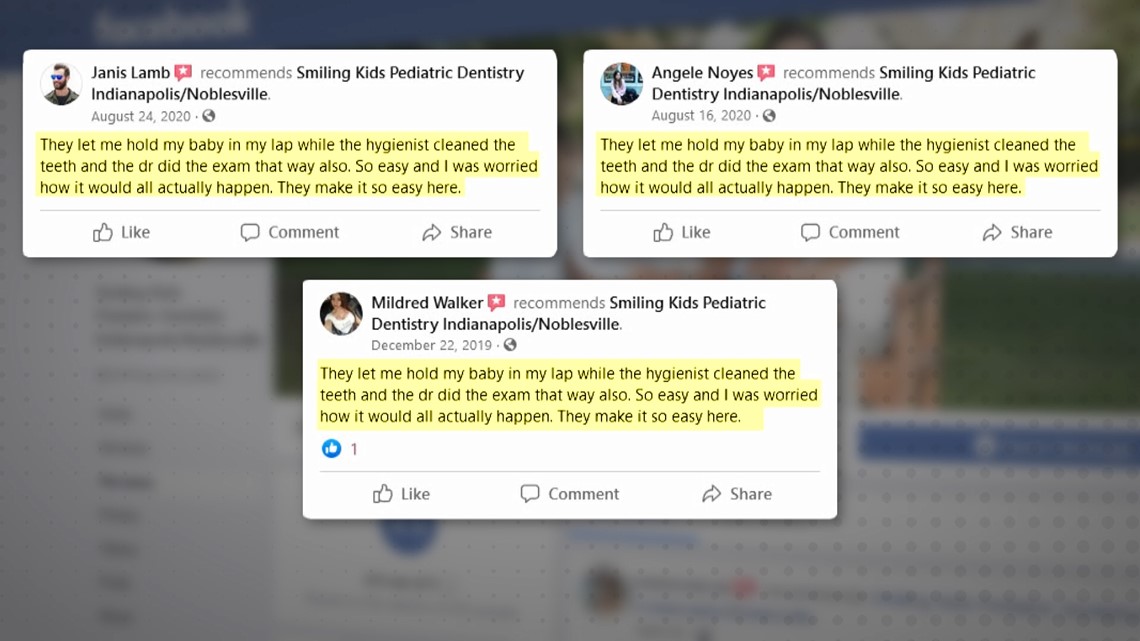
Some of the same Facebook reviews for the Indianapolis dentist also appeared on Google, supposedly written by different patients.
“It screams of something fishy,” Dean said. “Same thing word for word. They’re clearly fake.”
Adding to her suspicions, some of those reviews included profile pictures that were stock photos of models or pictures of celebrities that appeared to be lifted from other websites.
Another sign of potential review fraud, according to Dean, is the sudden appearance of a large number of 5-star reviews. That’s exactly what happened to Smiling Kids on January 3, 2020, when the pediatric dentists received more than 290 positive Facebook reviews in a single day.
And perhaps the biggest red flag of all: most of the reviews that suddenly appeared overnight do not seem to be intended for a dentist at all.
Dozens of the reviews rave about “fast service” and “speedy delivery” with “super fast postage time,” and compliment the dentists because everything was “well packaged” and “on time” with “attractive prices.”
“Those comments have nothing to do with a dentist practice, but when there are hundreds of reviews, most people only look at a few and never get far enough to see many of the comments that contribute to a high rating are rather ridiculous,” Dean explained.
While some of the reviews may be ridiculous, Dean is not laughing.
“I take it very seriously because of the impact it has. The current environment is cheating is rewarded, business ethics are eroding and millions of honest consumers and businesses suffer,” she told 13News.
Where fake reviews come from
Need a 5-star review on Yelp or Google? No problem.
The internet is full of online groups specifically devoted to buying, selling and trading fake online reviews.
13 Investigates found a Facebook club with thousands of members who post ads offering their fake review services every day.
Someone named Jerry, for example, posted an ad that said he is a “professional review provider” who can offer reviews for a “cheap price” in any country.
Another reviewer offered a “Holiday Sale” for fake reviews at a 30% discount. And while some of the group members sell custom Google reviews for $25 each, others offer “bulk” reviews for less than 25 cents apiece.
“They operate openly and flagrantly,” said Dean, adding that many fake reviews are the result of highly-organized, off-shore networks that are designed to deceive consumers.
To help you understand the scope of these networks and how they operate, Dean researched the reviewers who left many of the suspicious Facebook reviews for Smiling Kids. She tracked all of their recent reviews and entered the results into a spreadsheet so she could compare them.
Her investigation showed 24 of the same people who left a review for Smiling Kids Pediatric Dentist in Indianapolis, also left a review for the same garage door company in Las Vegas, the same wine distributor in Portugal and the same locksmith in England.
“Preposterous. I think statistically [it’s] probably not possible,” she said. “There was tremendous overlap in businesses being reviewed by these people… that shows me absolutely they’re not legitimate.”
Dentists respond

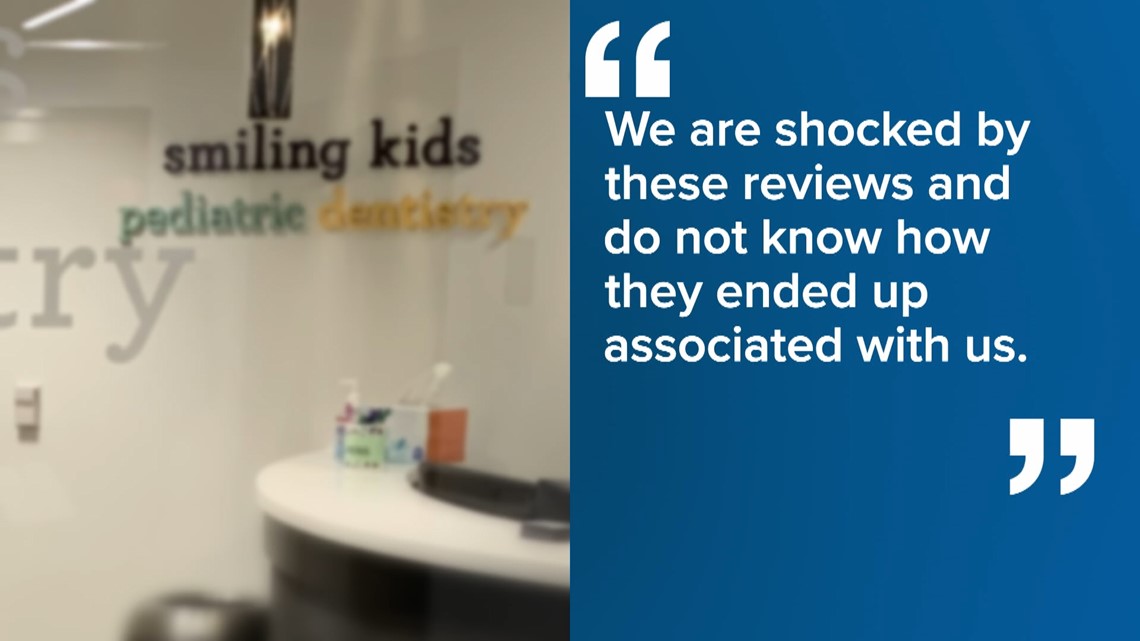
When 13 Investigates asked the owners of Smiling Kids Pediatric Dentistry to explain how they got so many fake reviews, Bullard and Singh told 13News they did not want to meet for an interview. But the dentists did send 13 Investigates a statement saying they are surprised to learn of the fake reviews, which they blamed on someone else:
“Over the last few years, in order to keep our focus on caring for our patients, we have found it necessary to hire other parties to help us with our social media presence, and we gave them access to our accounts, including personal accounts. The work we contracted for was limited to standard information posting, search engine optimization, and patient follow-up outreach. We have never contracted for, or in any way sought false reviews from non-patients. We are shocked by these reviews and do not know how they ended up associated with us. It has not been possible for us to monitor every review that is posted given the size of our office and the nature of our practice. Where possible, we will immediately disable all reviews from our accounts until we can verify which ones are from actual patients. Going forward, we will limit access to our accounts and monitor reviews for this type of unusual activity.”
Smiling Kids has, for now, disabled public access to its Facebook comments. Consumers can no longer read actual reviews, although they can still see that the pediatric dentistry practice receives a 4.9-star rating, which is unchanged despite the presence of many questionable reviews.
The dentists would not tell 13News the names of the companies or individuals they hired to manage their social media accounts and whether Smiling Kids is still using those third-party services. They also declined to answer other follow up questions from 13News, including why Dr. Singh’s personal Facebook account showed last year that she was a member of several online groups that are known for buying, selling and trading online reviews; why the dentists apparently did not notice they were receiving hundreds of reviews from people who were not their patients and who commented on things other than dentistry; and why the dentists gave someone else full access to operate both their business and personal social media accounts.
“It’s hard to understand how a business could not see there was something inherently wrong there,” said Jason Brown, a digital marketing expert who's been tracking fake reviews for years through his Review Fraud website. “Any business owner should know who their customers are, so if there’s a bunch of 5-star reviews from non-patients, they should know something fishy is happening. And I’ve never seen a business that has a marketing company for their social media that did not know what they were getting in return. Who pays good money without knowing what they’re getting? It doesn’t make sense.”
Millions and millions of fakes

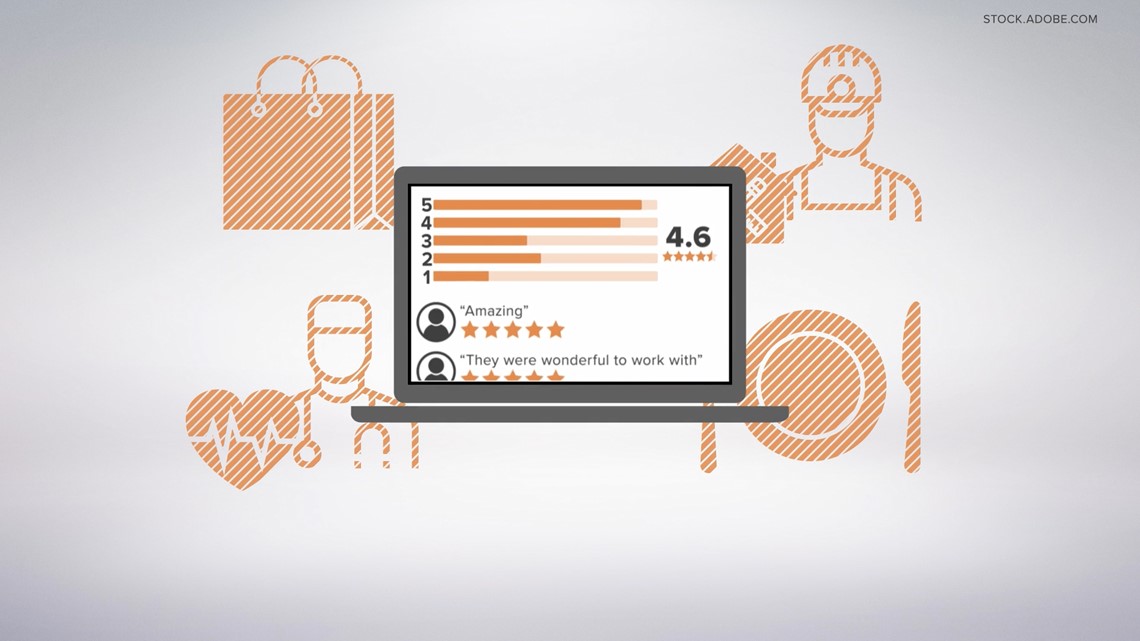
Tech companies acknowledge fake reviews are a problem, and they say they are trying to address it. Fraudulent reviews violate Facebook’s community standards policy and Google’s prohibited and restricted content policy.
Google’s media relations team provide additional information and details about how it attempts to limit fake reviews.
Google says its fraud monitoring program blocked 55 million fake reviews and 3 million fake business profiles in 2020. The tech company relies on trained analysts and automated systems to search for and remove fake reviews that circumvent its filters. Google said it has been closely watching Smiling Kids reviews for fraudulent activity – resulting in the removal of more than 250 fake reviews since fall.
“Our team has been monitoring the situation and has taken action on the fraudulent reviews, including removing policy-violating content and suspending associated user accounts. Our policies clearly state reviews must be based on real experiences and information, and we closely monitor 24/7 for fraudulent content. As bad actors constantly evolve their practices, we continue to invest in ways to keep the information on Maps authentic and reliable,” a Google representative told 13News.
Facebook did not respond to 13News’ questions about enforcing its policy against fake reviews, however the company reportedly removed more than 16,000 groups trading fake reviews because of pressure from European regulators, according to The Guardian.
Trustpilot removed 2.2 million fake reviews from its website in 2020, according to the company’s transparency report.
And Yelp told 13News that its automated recommendation software rejected 4.3 million reviews in 2021 due to suspicions that they were fake, solicited or otherwise unreliable.
Online platforms that offer reviews say they will remove questionable reviews when they are reported, but industry insiders and regulators say the number of fake online reviews is still growing. As a result, millions of bogus reviews are mingled in among real ones, and it can be very difficult and time consuming to tell the difference.
“Oh, it’s huge, and the problem just keeps getting bigger and it’s not going away,” Brown said.
The owner of the locksmith company reviewed by James, Noel and Krissy told 13 Investigates even he didn’t realize some of the Google reviews listed for his company aren’t real.
“You are shocking me right now. I didn’t know the existence of these reviews and I have no idea how they got there,” the owner said. “We have no control over what other people do.”
Fake reviews don’t necessarily mean a business offers poor quality services or products. 13News spoke with people who had both positive and negative experiences at Smiling Kids. The reviews can, however, suggest a company is either trying too hard to create a positive online image to attract new customers or it is attempting to bury negative reviews.
“I see it most often when businesses want to cover up negative reviews that were left by real customers,” Brown said. “Reviews are supposed be a way to show what businesses are doing right and wrong -- feedback to show how they can improve their customers’ experiences -- but now businesses want to bury negative reviews so customers don’t see them.”
The tactic is often successful and goes unnoticed, but it can also backfire if customers catch on.
There is also a legal risk because fraudulent reviews are actually illegal under both state and federal law.
Why fake reviews are illegal

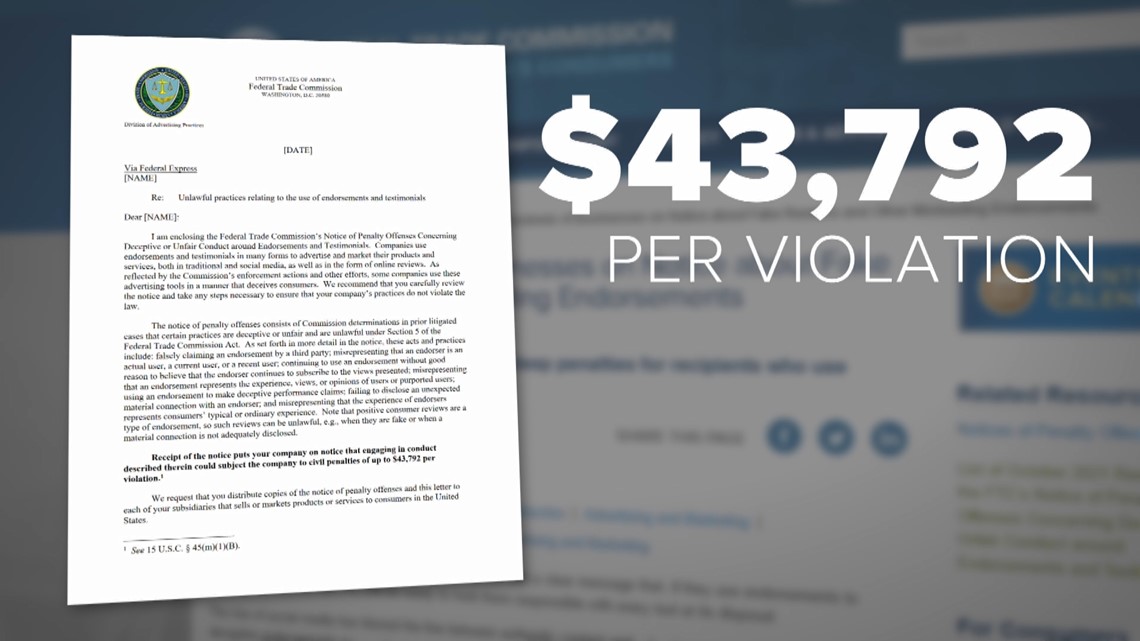
Any advertising or other sales practices that are designed to fool consumers are considered illegal under Indiana’s Deceptive Consumer Sales Act, according to chief legal counsel Scott Barnhart who oversees the Indiana Attorney General’s Consumer Protection Office. Barnhart says his offices sees surprisingly few complaints about fake reviews because most consumers cannot recognize which reviews are fraudulent.
“When consumers go online and do their shopping online, they are relying on reviews,” he told 13News. “Very often they have a difficult time discerning whether a review is genuine or whether it’s a fake review. It’s absolutely a problem.”
The problem is made worse because tech companies that offer reviews rarely tell consumers when they take action to remove a company’s fake reviews.
“Reviews might disappear, but you don’t get to know that information. Wouldn’t you want to know if a business you’re looking at has been caught cheating?” asked Dean.
Brown agrees.
“As a consumer, you should know someone got caught doing something they’re not supposed to do. When we can’t tell a business got caught doing something and they are allowed to do it again, we are all getting hoodwinked,” he said.
Yelp is one of the few platforms that flags fake reviews when it is able to prove a blatant and coordinated attempt took place to deceive consumers. The company says it placed 1800 Consumer Alerts on its business pages in 2021.
Fake reviews also violate Section 5 of the Federal Trade Commission Act, which prohibits false testimonials. FTC rules also ban the exchange of gifts or prizes in return for reviews unless the exchange is acknowledged in the review.
That section of federal code prompted 13 Investigates to ask Smiling Kids about its use of incentives to encourage customers to write 5-star reviews.
Some Smiling Kids clients claim the dentistry practice offered gift cards for clients willing to provide 5-star reviews on social media sites. And during a recent trip to Smiling Kids’ Indianapolis office, 13News observed a sign that offered clients entry into a prize drawing for a virtual reality gaming system in exchange for writing a 5-star review on Google. The gaming system retails for $300.
Bullard and Singh chose not to respond to questions about the incentives.
While fake reviews are illegal, law enforcement has done little to crack down on companies that buy and sell fraudulent reviews. Prosecution is nearly non-existent, which means companies can enjoy the benefit of fake reviews to help drive their business without worrying about risk.
“People are incentivized to do whatever they can to try to game the system because there are few consequences. I’ve seen businesses that got caught three or four times and there’s no real penalty,” Brown said.
“I think people should be punished and prosecuted for review fraud,” added Dean. “The problem is really quite serious and the tech companies are not doing enough. How can Facebook allow obviously fraudulent review patterns and look the other way? It’s really terrible.”
The Federal Trade Commission is signaling a more aggressive approach when it comes to policing fraudulent online reviews. It recently sent Notice of Penalty letters to hundreds of companies, warning that using fake reviews can result in fines of nearly $44,000 per violation.
“Fake reviews and other forms of deceptive endorsements cheat consumers and undercut honest businesses,” Samuel Levine, director of the FTC’s Bureau of Consumer Protection, said last fall when the letters were mailed. “Advertisers will pay a price if they engage in these deceptive practices.”
But until actual enforcement takes place, Dean says “buyer beware” anytime you look at an online review.
“I would view online reviews like advertising,” she said. “Parents always caution their children ‘Don’t talk to strangers. Be careful of strangers.’ Well, my advice is the same to consumers. Don’t necessarily trust the review of a complete stranger you’ve never met. Actually they may not be a real person at all.”
Warning signs to help you spot a fake review
Consumer advocates say if you are going to rely on online reviews to make a purchase or choose a service provider, don’t browse the reviews. Study them. Here are warning signs to look for if you want to detect fake reviews…
- Reviews that seem unrelated to the business. If you are looking for a pet groomer, be suspicious of reviews that say “Always delicious” or “Had a great time and can’t wait to go back!” Reviews that are overly vague and not relevant to the business are one of the top warning signs of a fake review.
- Lots of reviews published around the same time. Pay attention to the dates of reviews. If a company gets many reviews in the same day, the same week or the same month, there may be reason for suspicion. It could signal the company is purchasing reviews or that it is offering incentives for customers to leave positive comments. Large or very popular companies may get a large number of reviews. You can still check to see if the review dates are distributed somewhat evenly and randomly or if they are all bunched together.
- Celebrity or stock profile pictures. It is possible a legitimate reviewer may be using the profile picture of a famous actor or politician, but you would not expect to see a large number of celebrity photos when examining reviewer profile pictures for a specific business. If a reviewer photo looks familiar or particularly glamorous, you can quickly perform a reverse image search to see if it belongs to someone famous. Just right click on the photo and save it, then upload it to an image search tool like Google Images or Tineye.
- Repeat reviews. If multiple people leave the exact same review (especially a detailed one), it’s cause for skepticism.
- Nothing but 5-star reviews. Have you ever gotten 20 people to all agree on the same thing? Probably not. So to think that 20 people would be unanimous in giving a business a perfect review is probably naïve. It is possible, but as the number of reviews for a business grows to 50, 100 or 200, you’ll want to be even more skeptical of companies that somehow pull off a perfect score from every single reviewer.
- Professional reviewers. On some review platforms like Google, you can see how many reviews someone has written and, in some cases, take a look at all of their reviews. If someone has left 30 reviews and 22 of them are for plumbers, you’re probably dealing with someone who either has very old pipes or who is a professional reviewer who gets paid for solicited reviews. If it’s the later, don’t take the reviews too seriously.
Other tips when using online reviews…
- Look at multiple review sites. Businesses that have a 5.0 rating on one review site might have a 3.8 rating on another. Consider multiple review platforms when making a purchase or choosing a service using online reviews.
- Report suspicious reviews. Most review platforms have tools to report fake reviews and want you to use them.
- Get personal recommendations from people you trust. When possible, ask family members or trusted friends for recommendations rather than an online stranger.


